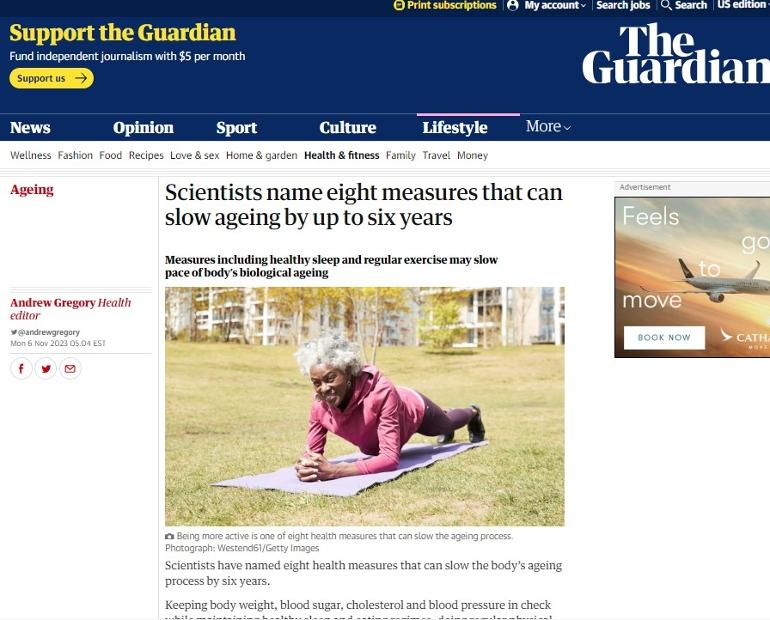The Guardian : theguardian.com/science/202...
Scientists name eight measures that can slow ageing by up to six years
Measures including healthy sleep and regular exercise may slow pace of body’s biological ageing
Andrew Gregory Health editor @andrewgregory Mon 6 Nov 2023 05.04 EST
Scientists have named eight health measures that can slow the body’s ageing process by six years.
Keeping body weight, blood sugar, cholesterol and blood pressure in check while maintaining healthy sleep and eating regimes, doing regular physical activity and not smoking may slow the ageing process by around six years, US experts say.
A study suggests that following these measures promotes good heart health, which in turn may slow the pace of biological ageing by up to six years.
The findings, based on data from more than 6,500 adults with an average age of 47, are being presented at the American Heart Association (AHA) Scientific Sessions conference in Philadelphia.
Researchers said people with the best cardiovascular health were about six years younger biologically – the pace at which they have aged for every year alive – than their actual age.
“These findings help us understand the link between chronological age and biological age and how following healthy lifestyle habits can help us live longer,” said Donald Lloyd-Jones, the chair of the writing group for Life’s Essential 8, the AHA’s health assessment tool.
“Everyone wants to live longer, yet more importantly, we want to live healthier longer so we can really enjoy and have good quality of life for as many years as possible,” said Lloyd-Jones, a past volunteer president of the AHA.
Life’s Essential 8 aims to define heart health based on four modifiable lifestyle measures and four modifiable health markers.
To measure a person’s phenotypic, or biological, age the researchers checked their metabolism, organ function and inflammation.
Phenotypic age acceleration is the difference between one’s biological age and actual age, with higher values indicating faster biological ageing.
After accounting for social, economic and demographic factors, researchers said having the highest Life’s Essential 8 score – which means having good cardiovascular health – was associated with a biological age of about six years younger.
The senior study author Nour Makarem, an assistant professor of epidemiology at the Mailman school of public health at Columbia University Irving Medical Centre, in New York City, said: “We found that higher cardiovascular health is associated with decelerated biological ageing, as measured by phenotypic age.
“We also found a dose-dependent association – as heart health goes up, biological ageing goes down.”
For example, the average actual age of those with good heart health was 41, yet their average biological age was 36; and the average actual age of those who had poor cardiovascular health was 53, though their average biological age was 57.
Makarem said: “Greater adherence to all Life’s Essential 8 metrics and improving your cardiovascular health can slow down your body’s ageing process and have a lot of benefits down the line.”
The eight health measures named by the American Heart Association:
Eat a healthy diet
Be more active
Quit smoking
Get healthy sleep
Maintain a healthy weight
Control cholesterol
Watch blood sugar
Manage blood pressure
